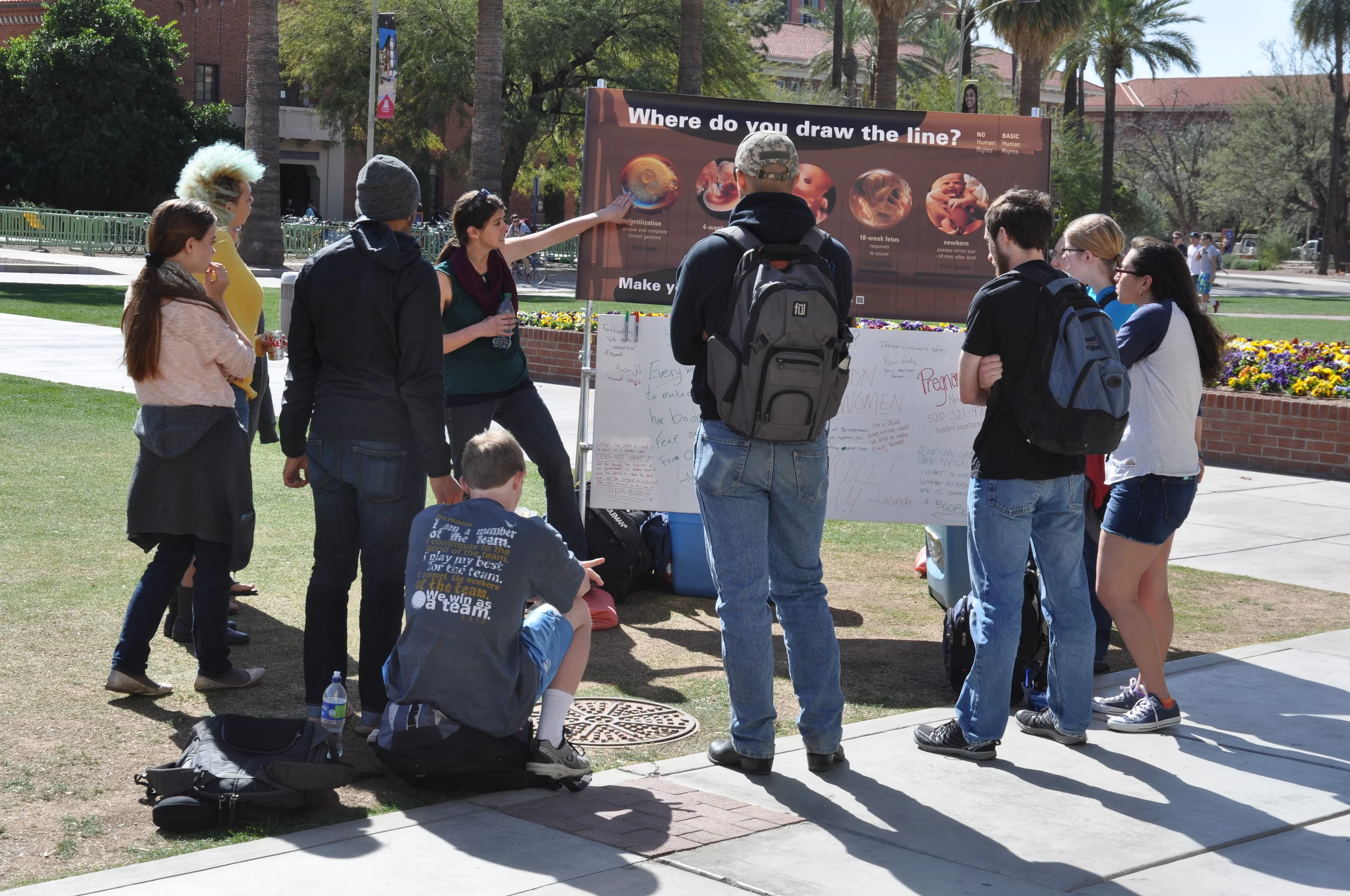Conversations: September 2015
Phase 1
Navigating a one-on-one conversation about a controversial subject can be difficult. Now add nine more people with varying opinions. Is it possible for the conversation to remain productive, or at least civil? At our University of Arizona outreach in February 2015, I watched a one-on-one conversation transform into a conversation with a crowd that lasted three hours.
“Michael” (Phase 1) approached me in order to share his view that he didn’t believe life began at conception. Overhearing the conversation, two other students wandered over to listen in (Phase 2). Then two more students arrived and began peppering me with their opinions and thoughts, including multiple questions related to their disagreements regarding what they had heard me discuss with Michael.
At this point there was no way to answer every student’s questions at the same time (not to mention that every response I shared prompted more questions). In order to respect Michael, and not forget him in the midst of this developing crowd, I asked a favor of all five students. I said something like,
Phase 2
“You are all bringing up important topics and questions to cover. I want to answer all of them, but I want to respect each of you by doing it in an orderly fashion so that we don’t miss anything. Here are the concerns I have heard:
What about poverty? What about women who don’t have the means to care for a child?
What about women who already have too many children?
What about a woman who has been violated (rape)?
Women’s liberty: Doesn’t the pro-life view violate our liberties?
The unborn aren’t human so shouldn’t abortion only be illegal after we become human?
Men shouldn’t have an opinion in this matter. It’s a woman’s body. So it’s her choice.
“I need your help though. Please help me remember each of these questions if I forget one. If you have another question, let me know so that we can add it to the list. I am going to start by answering one of Michael’s questions first, the one about women who don’t seem to have the financial means to care for a child.”
Phase 3
In the next three hours I witnessed something beautiful unfold. Because each of the students knew that I thought addressing each question was important, they patiently waited their turn. As more and more students wandered over to listen in (with most of them eventually joining in) each one witnessed a particular type of conversation taking place: It was a conversation in which disagreement was readily present but anger was absent. People were asking questions to seek clarification. People were actively listening to understand each other. People where not interrupting each other.
This respectful conversation set a precedent, and this precedent caused a second beautiful response from the students. Newcomers recognized the calm demeanor of those who disagreed with me and quickly followed suit. So much so, that they would even raise their hands (see Phase 3 above) and wait for me to call on them before sharing thoughts or asking questions.
At one point in the conversation I was able to ask the students present how they felt after the past hour of conversation. One of the students had changed his mind about when we are biologically human. Another student felt that abortion should still be legal but not in as many cases as she had originally thought. A third student commented that, although she was still pro-choice, she had never heard these pro-life arguments and they made sense. Later that day a fourth student returned to tell me that although he is pro-life he had never witnessed a conversation about abortion like that one. He was amazed by the response of the students.
One pro-choice student who joined the group conversation had spent two hours in conversation with me the day prior. During the group discussion he responded to several of the pro-choice arguments using the same pro-life responses I had shared with him the day before. Although he stated he was still pro-choice, it was clear that he now also saw the validity in some of the arguments I had proposed to him.
Thank you for helping JFA turn the debate about abortion into a productive dialogue by respecting the dignity of the unborn while also respecting the dignity of each person in the conversation.




